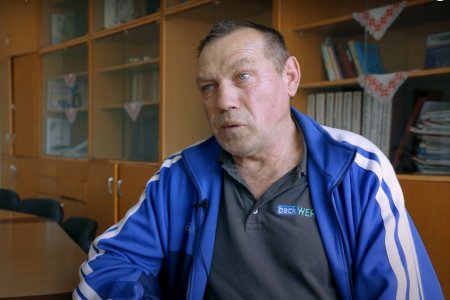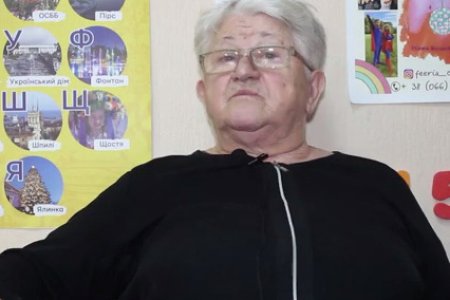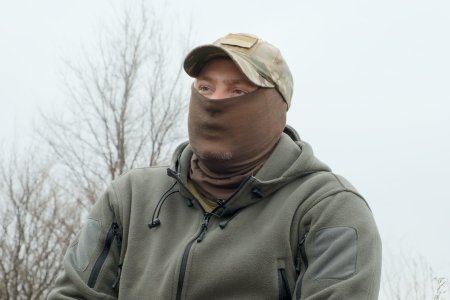I used to live in the Nizhynsk region but later moved here. I have lived here for eleven years while my son and his family lived in Brovary.
What happened in the Velyka Dymerka?
The Russians came here on 13 March. They arrived in tanks. One stood here where the trailer is now. And two tanks stood behind our cellar, on other people’s property. People said they were armored personnel carriers and tanks, but they were all tanks for me. They were driving down the road and shooting. Two houses were on fire. I was looking out the window in my home and saw houses burning and the tanks coming. I thought perhaps my house was on fire. Who knows? I couldn’t see it. I ran into the cellar and hid. Everything was set up there earlier. The son lives in Brovary, and just before the war, they were here, and I took everything to the cellar. I thought we would all hide because it was unknown how it would turn out. When everything happened, they decided to leave. They told me: “Let’s go!” And I answered: “No, I will not leave the house. Go, save the children; go along with them, and I’ll be here.” They went. Thank God they went. If God forbid they had stayed, they would not have been alive. So I hid in the cellar and sat there for five minutes when I heard the gates crack. And it was they [Russians on tanks] who were coming. What if they drive over the cellar and bury me there? There was no one around — who would look for me? I would sit there until I die. But they did not come to the cellar.
They drove, destroying everything. The apricot tree has fallen. Then they opened the door to the cellar: “Who’s there?!”
I couldn’t be silent and answered: “I’m here.” — “Hands up and get out!” — “I’m alone here, an old woman. There is no one else here.” — “Get out!” Well, I raised my hands and got out. There were ten of them with machine guns against one woman. “That’s it, and there’s no one else.” One said to the other: “Go check it out!” He checked, but no one was there. Then they went into the house and told me: “Come with us.” I went in, and they started asking where my children were. I told them the eldest son is in Russia, in the Briansk region. He went to college at 20 after the army and stayed there. He married and still lives there. And the younger ones left before the war. “Where?” — “Abroad, how should I know?"
They arrived in the afternoon of 13 March. Then they left, and I stayed in the house. And there, behind the landing, were ours. They must have learned that there were Russian tanks here and started firing. Grenades or something else ... There were so many craters! There was a huge one between our house and the neighbor’s house! I wanted to spend the night in the cellar but found it was packed, and they told me: “Go home!"
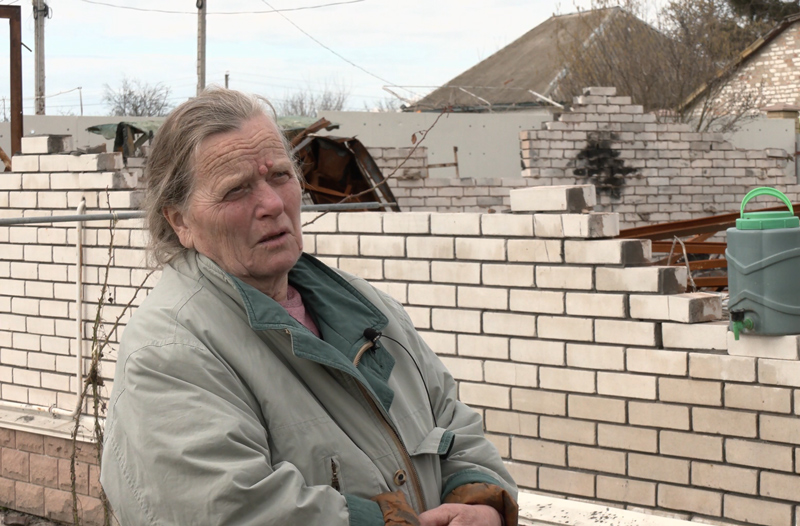
Did Russians hide in your cellar?
Russians, yes. They hid in the cellar and sent me home. Well, what should I have told them? I turned around and went — it will be as God wills. I was at home and went out in the morning; they said: “Pack up and leave.” — “Where should I go?!” — “Go to the street, and then to the neighbors. It’s going to be bad here!” Their tank was near our cellar before, but I saw it drove away. Those soldiers were sitting on the top, rolling up sleeping bags. “Go,” — they said. I answered that all my neighbors had left, and I didn’t know if anyone further down the street had stayed or they also left. “Go! There is a big house over there, and there are small children so no one will touch them. And you go there.” I went, and they brought me to that house with machine guns. Thanks to the people who accepted me. I went as I was, keeping only the icon in my bosom. I went there and said they kicked me out of my house and told me to come here. What will happen there — I don’t know; they said something terrible.
An hour has passed, maybe an hour and a half, and Hennadii (the owner) looked out and said: “Your house is on fire.” They blew up a tank near the cellar, and everything around caught fire.
We had a wooden house. Everything burned down. Everything. The neighboring house too. Their walls remained because they were made of cinder blocks. But you never know, and they are afraid to repair it. They said they would take it apart and rebuild it. But what will happen to us? There are two days since I arrived. Warm weather is in the forecast for this week. You know, I don’t want to sit in an apartment. I got used to living in the village. The children went to work, and the grandchildren went to school, but I am rambling.
Could you imagine that there will be a full-scale war?
Of course, I couldn’t. I believed it only when I heard that they were coming here. However, I couldn’t believe it when it was all far away. Well, they took Crimea, but ours will someday take it back. But now they got here. When they came to the house, I asked: “What do you need? You have Russia, three times more than Ukraine. You have everything, gas and oil, and everyone buys from you, what did you come for?” And one, apparently their boss, said: “We need Zelenskyi.” I answered: “So only women live here; Zelenskyi is not here.” So it was, but they kicked me out of the house. And I didn’t take the documents from the cellar when they kicked me out. I was not thinking about it. Then I told the people who sheltered me: “I’ll go and check. Maybe it is in the cellar, or maybe they destroyed it.” After all, they pulled out a piece of paper with all the phone numbers, and I couldn’t call anywhere.
They said: “As you wish. Go, but we won’t go there.” I answered: “If I don’t return, so be it. And if they don’t kill me, I’ll come back.”
I went back and scrambled into the cellar. I opened the door, and there was horror. Everything burned down. God, I thought the documents burned down. I threw them on potatoes earlier: I threw a bag with documents near the wall. Although the bag melted, the documents remained, only slightly smoked. I stood there, and the Russian was next to the machine gun and said: “Well, are you still alive?” — “Yes, still alive.” — “So, go and don’t come back.” — “Okay, I’ll take the documents and go; I have nowhere else to return.” My house was no longer there. And they [Russians] were not in the cellar, as everything burned out there. How it burned out, I don’t know. There was a hole for ventilation, but maybe something fell in there. The walls all collapsed, and the cellar was dilapidated. It was no longer possible to stay there. Jars fell off the shelves. It was such a mess... So they didn’t sit there anymore. They were in the house of the woman Aniuta. Her windows were broken, but the place was intact, livable.
What happened after you got kicked out?
I spent a week in the basement of those people, Kozak. And then they left, but I didn’t want to go, as I had no means to escape. They were leaving, and I said: “I will not go. Can I stay in your basement? — “How can you not go?” — “Well, I wore the same sweatshirt and felt boots for a week. If I sit on the bus, people will turn their backs on me.” But that woman gave me clothes to change: “Come on, come on!” I got on the bus and arrived at Brovary. That man had my son’s phone number; he called and said that I was on the bus with such and such a number, and my son met me in Brovary. He took his family away: his wife and children, and returned. He works in Kyiv. He returned to work, picked me up, and took me to my grandchildren and daughter-in-law in the Khmelnytsky region.
When did you return?
You know, I don’t remember what date. We returned before Easter.
In April?
Probably, yeah. I already forgot what date Easter was.
Tell me about your house.
Big. It was a big and beautiful house. The grandchildren visited. Yes, grandchildren came ...
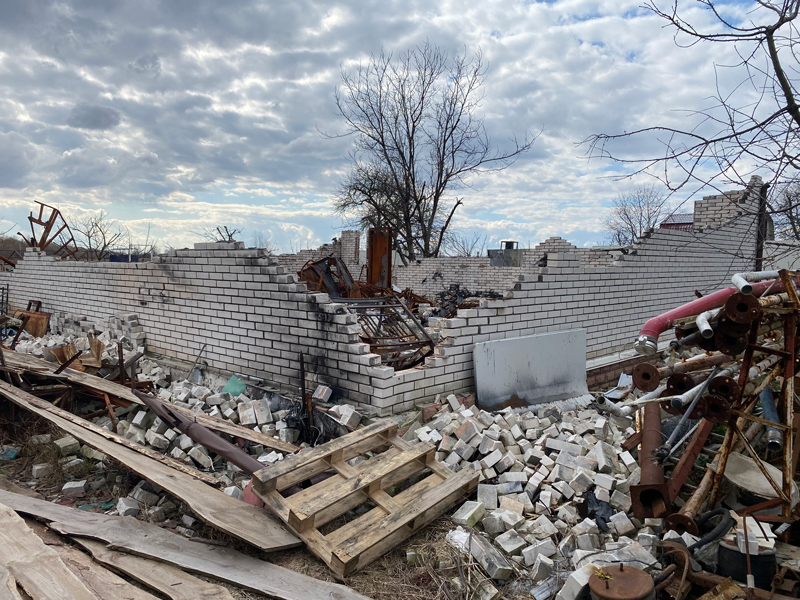
Do you currently live in your son’s apartment?
Yes. I will return here in the summer. Now I am here because they said the weather will be warm for a week. My son didn’t want me to go, but I said: “No,” and he brought me a heater. He got this trailer last summer. At first, it stood in the field, and I spent last summer in it. He moved it here in the winter. I said not to bother and spent money on something else, but he didn’t listen and moved it here. I will be gardening. At least I’ll do something.
What other crimes did the Russians commit?
To keep people in basements, I have never heard of such a thing. However, they looted, and it is a fact. People left, abandoning everything, and many left cars. So the Russians drove here in cars, on motorcycles. And the stores were cleared. There was the case when they drove with the trunk open, full of oil bottles. The whole trunk of oil did not even close, but they went and had fun.
Has your attitude towards Russians changed?
You know they’re not all bad. My son has lived in Russia for 35 years. But he calls me every weekend and asks how we are and what’s happening. He apologizes for not being able to help. I don’t know how to say this, but I wish them to experience what we experienced. Whoever is against us, let them survive the same. But I pity innocent people. And God will punish him, the monster [Putin’s], and those behind him.
